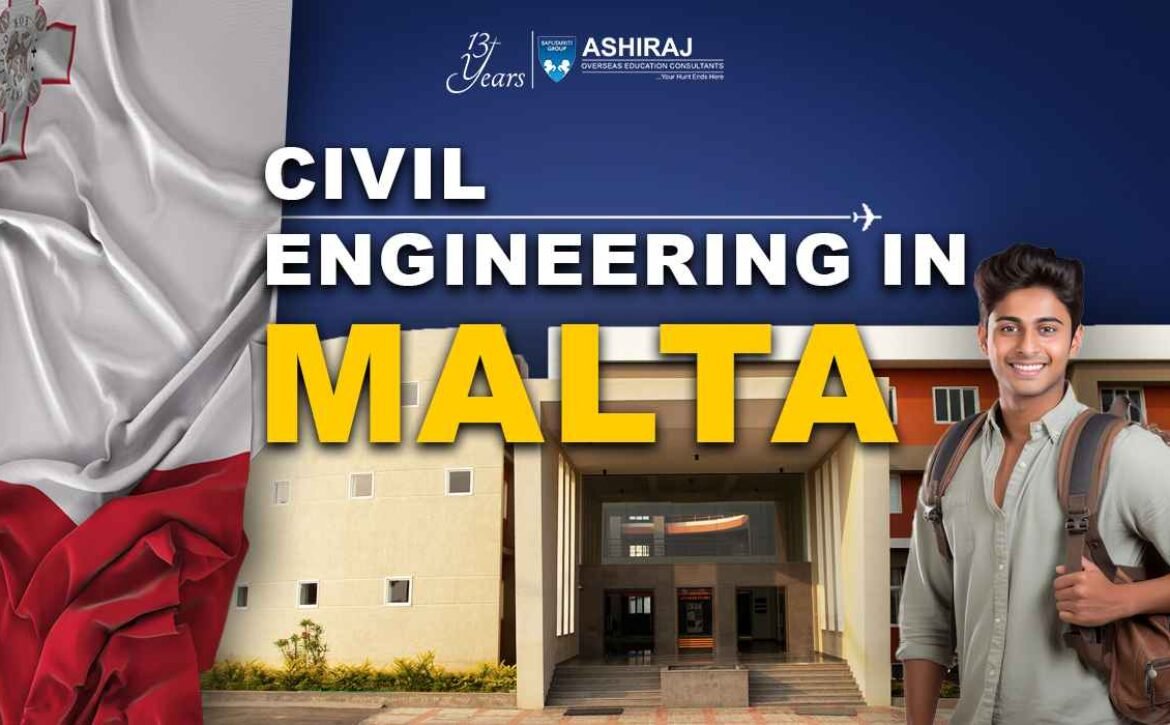
Civil Engineering in Malta
Civil Engineering in Malta offers a unique blend of tradition and modernity, reflecting the island nation’s rich history and contemporary advancements. Known for its strategic Mediterranean location, Malta is an ideal setting for studying civil engineering due to its diverse infrastructure needs and developmental projects. Students pursuing Civil Engineering in Malta benefit from a curriculum that integrates theoretical knowledge with practical applications, tailored to address local and international engineering challenges.
The island’s robust educational framework supports future engineers with state-of-the-art facilities and industry connections, ensuring a comprehensive learning experience. Graduates of Civil Engineering in Malta are well-equipped to tackle global and local infrastructure issues, contributing to the region’s ongoing development and innovation. By combining historical insights with cutting-edge technology, the program provides a solid foundation for a successful career in civil engineering.
Why to Study Civil Engineering in Malta?
- Strategic Location: Civil Engineering in Malta offers a unique perspective due to Malta’s strategic position in the Mediterranean, making it an ideal location for studying infrastructure and urban planning relevant to diverse geographic and climatic conditions.
- High-Quality Education: Malta’s educational institutions provide top-notch programs in Civil Engineering in Malta, featuring modern facilities, expert faculty, and a curriculum that aligns with international standards.
- Practical Experience: Students gain hands-on experience through internships and projects that address real-world challenges, ensuring they are well-prepared for the demands of the civil engineering profession.
- Growing Industry: The Maltese construction and infrastructure sectors are expanding, creating numerous opportunities for graduates of Civil Engineering in Malta to contribute to significant projects and developments.
- Multicultural Environment: Studying Civil Engineering in Malta provides exposure to a diverse cultural environment, enhancing global perspectives and professional networks.
- Career Opportunities: Graduates benefit from a robust job market with various roles in both local and international projects, reflecting the growing demand for civil engineers in the region.
- Cultural Heritage: Malta’s rich history and architectural heritage provide a unique context for studying civil engineering, combining historical insights with modern engineering practices.
Top Universities to Study Civil Engineering in Malta
University | QS World University Rankings 2023 | Type of University | Average Annual Fees | Programs Offered |
1. University of Malta | #801-1000 | Public | €7,000 – €9,000 | BSc in Civil Engineering, MSc in Civil Engineering |
2. MCAST (Malta College of Arts, Science and Technology) | Not Ranked | Public | €6,000 – €8,000 | BEng in Civil Engineering, MSc in Civil Engineering |
3. St. Martin’s Institute | Not Ranked | Private | €5,000 – €7,000 | BSc in Civil Engineering, MSc in Civil Engineering |
4. University of Gozo | Not Ranked | Public | €6,500 – €8,500 | BEng in Civil Engineering, MSc in Civil Engineering |
5. Malta University of Science and Technology | Not Ranked | Private | €7,000 – €9,000 | BSc in Civil Engineering, MSc in Civil Engineering |
This table lists the top universities for Civil Engineering in Malta according to the QS World University Rankings 2023, including details about each institution’s type, average annual fees, and programs offered.
Course Curriculum for Civil Engineering in Malta
- Foundation Courses: The Civil Engineering in Malta curriculum begins with foundational courses in mathematics, physics, and engineering principles, essential for understanding complex engineering concepts.
- Structural Analysis: Students study structural analysis and design, focusing on analyzing and designing various structures such as bridges, buildings, and dams.
- Geotechnical Engineering: The curriculum includes geotechnical engineering, covering soil mechanics, foundation design, and ground improvement techniques critical for construction projects.
- Fluid Mechanics: Courses in fluid mechanics address the behavior of fluids and their applications in water supply, drainage systems, and hydraulic engineering.
- Construction Management: Students gain skills in construction management, learning about project planning, scheduling, cost estimation, and quality control to ensure effective project execution.
- Environmental Engineering: The Civil Engineering in Malta program includes environmental engineering courses, focusing on waste management, pollution control, and sustainable practices.
- Design Projects: The curriculum features design projects and practical assignments, allowing students to apply theoretical knowledge to real-world engineering problems.
- Internships: Practical experience through internships and industry placements is integrated, providing hands-on exposure to the civil engineering field.
- Advanced Topics: Advanced courses cover specialized areas such as earthquake engineering, transportation engineering, and advanced structural design.
Eligibility Criteria & Admission Requirements for MS in Civil Engineering in Malta
- Academic Qualifications: Applicants must have a relevant undergraduate degree or equivalent qualifications in engineering or a related field to pursue a master’s program in Civil Engineering in Malta.
- Language Proficiency: Proficiency in English is required. Acceptable tests and minimum scores are:
Test | Minimum Score |
IELTS | 6.5 |
TOEFL | 90 |
GRE | 300 |
GMAT | 550 |
- Passport & Student Visa: A valid passport and a student visa are required for international students to study Civil Engineering in Malta. The visa application process includes proof of acceptance and financial stability.
- Academic Certificates: Transcripts and certificates from previous academic institutions must be submitted, verifying the completion of required courses and degrees.
- Work Experience: Some programs may require relevant work experience or internships in the civil engineering field. This experience helps demonstrate practical knowledge and skills.
- Additional Documents: Applicants need to provide letters of recommendation, a statement of purpose, and a CV detailing academic and professional achievements.
Documents Required for Studying Civil Engineering in Malta
- Passport: A valid passport is essential for international students applying for Civil Engineering in Malta. It serves as proof of identity and nationality.
- Letters of Recommendation (LOR): Two letters of recommendation are required from academic or professional references who can attest to the applicant’s qualifications and suitability for the program.
- Statement of Purpose (SOP): A well-written statement of purpose outlining the applicant’s motivation, career goals, and why they are interested in studying Civil Engineering in Malta is needed.
- Curriculum Vitae (CV): An updated CV detailing academic background, work experience, and any relevant skills or achievements should be submitted.
- Official High School Transcripts: Official transcripts from high school or previous educational institutions must be provided to verify academic performance and qualifications.
- Certificates: Copies of academic certificates and diplomas are required to demonstrate the completion of necessary education levels.
- Work Experience Certificate: If applicable, a certificate verifying relevant work experience or internships in the civil engineering field should be included.
- Proof of Financial Resources: Evidence of sufficient financial resources to cover tuition fees and living expenses in Malta must be provided, ensuring the ability to study and reside in the country.
Admission Process for Civil Engineering in Malta
- Research Programs: Research universities in Malta offering Civil Engineering in Malta to identify programs that match your academic and career goals.
- Check Admission Requirements: Review the specific admission requirements for the Civil Engineering programs, including academic qualifications, language proficiency, and standardized test scores.
- Prepare Documents: Gather all necessary documents, including your passport, letters of recommendation, statement of purpose, CV, official high school transcripts, academic certificates, work experience certificate, and proof of financial resources.
- Submit Application: Complete and submit your application form to the chosen university. Ensure all required documents are included and meet the application deadlines.
- Pay Application Fee: Some universities may require an application fee. Ensure this is paid as part of the application process.
- Attend Interviews: If required, attend an interview or entrance exam. This may be conducted in person or online, depending on the university’s procedure.
- Receive Offer Letter: If accepted, you will receive an offer letter from the university. Review and accept the offer as per the instructions provided.
- Apply for Student Visa: With the offer letter, apply for a student visa to study Civil Engineering in Malta. Provide all necessary documentation to the immigration authorities.
- Enroll and Register: Upon arrival in Malta, complete the enrollment process at the university and register for your courses.
“Education is the most powerful weapon which you can use to change the world.”
Nelson Mandela
Cost of Civil Engineering Course in Malta
- Tuition Fees: The annual tuition fees for Civil Engineering in Malta typically range from €6,000 to €9,000 depending on the university and program level.
- Application Fees: Some universities charge an application fee, usually between €50 and €100, which is non-refundable.
- Living Expenses: Monthly living costs, including accommodation, food, and transportation, are estimated to be between €600 and €1,000.
- Accommodation: Renting a student apartment or living in university-provided housing costs approximately €300 to €600 per month.
- Health Insurance: International students may need to purchase health insurance, costing around €200 to €300 annually.
- Books and Supplies: Budget for books and study materials, which can amount to €100 to €300 per year.
- Student Visa Fees: The student visa application fee is typically around €60 to €100, depending on your home country.
- Miscellaneous Costs: Additional expenses such as social activities, personal items, and unforeseen costs should be considered, potentially adding €200 to €300 to the yearly budget.
Understanding the total cost of Civil Engineering in Malta helps in better financial planning and ensures a smooth study experience.
Scholarships for Civil Engineering Courses in Malta
Scholarship | Amount | Application Deadline | Details |
1. Malta Government Scholarship | €2,000 – €5,000 | June 30 | Offered to international students pursuing Civil Engineering in Malta; based on academic merit and financial need. |
2. University of Malta Merit Scholarship | €1,500 – €3,000 | July 15 | Available for top-performing students in Civil Engineering programs at the University of Malta. |
3. MCAST Scholarships | €1,000 – €2,500 | August 1 | For students enrolling in Civil Engineering at MCAST, awarded based on academic excellence and potential. |
4. Private Industry Scholarships | Varies (up to €3,500) | September 1 | Sponsored by companies and organizations in Malta supporting students in Civil Engineering; application often includes a competitive process. |
5. Erasmus+ Program | €2,000 – €4,000 | Rolling admissions | Provides funding for international students participating in exchange programs in Civil Engineering in Malta; specific deadlines vary by institution. |
This table outlines available scholarships for Civil Engineering in Malta, including their amounts, application deadlines, and additional details. These scholarships support students financially while pursuing their degrees, easing the burden of educational expenses.
Career Opportunities After Civil Engineering in Malta
Job Profile | Average Salary | Details |
1. Civil Engineer | €30,000 – €45,000 | Civil Engineers in Malta work on infrastructure projects, including roads, bridges, and buildings. Salaries vary based on experience and project size. |
2. Structural Engineer | €32,000 – €48,000 | Specializes in designing and analyzing structural systems. This role involves ensuring the safety and stability of constructions in Civil Engineering in Malta. |
3. Project Manager | €40,000 – €55,000 | Manages construction projects from inception to completion. Responsibilities include budgeting, scheduling, and overseeing the work of engineers and contractors. |
4. Geotechnical Engineer | €35,000 – €50,000 | Focuses on the behavior of soil and rock around civil engineering projects. Essential for projects requiring deep foundations or ground improvement. |
5. Environmental Engineer | €30,000 – €44,000 | Works on projects that impact the environment, such as waste management and pollution control. This role is crucial for sustainable development in Civil Engineering in Malta. |
This table highlights career opportunities available after completing a degree in Civil Engineering in Malta, detailing various job profiles and their respective average salaries. These roles encompass a range of responsibilities within the civil engineering sector, offering diverse career paths for graduates.
Frequently Asked Questions About Civil Engineering in Malta
To be admitted to a Civil Engineering program in Malta, you typically need a relevant undergraduate degree, proof of English proficiency (e.g., IELTS or TOEFL scores), and possibly GRE or GMAT scores. Additionally, you’ll need to submit academic transcripts, letters of recommendation, a statement of purpose, and a CV.
Major universities offering Civil Engineering in Malta include the University of Malta, MCAST (Malta College of Arts, Science and Technology), and St. Martin’s Institute. Each institution provides various undergraduate and postgraduate programs.
The average annual tuition fees for Civil Engineering in Malta range from €6,000 to €9,000. Additional costs include accommodation, living expenses, health insurance, and books.
Yes, scholarships are available for Civil Engineering in Malta. These include government scholarships, university merit-based scholarships, and industry-sponsored awards. Scholarship amounts and application deadlines vary by program.
Typically, undergraduate Civil Engineering programs in Malta take 3 to 4 years to complete, while master’s programs generally take 1 to 2 years.
Civil Engineering graduates in Malta can pursue careers as civil engineers, structural engineers, project managers, geotechnical engineers, and environmental engineers. The demand for skilled professionals in these fields is strong due to ongoing infrastructure projects.
Yes, many Civil Engineering programs in Malta include practical experience through internships, co-op placements, or project work. This hands-on experience is crucial for applying theoretical knowledge in real-world scenarios.
International students need to demonstrate English proficiency through tests like IELTS or TOEFL. Typically, a minimum IELTS score of 6.5 or a TOEFL score of 90 is required.
Yes, international students in Malta can work part-time during their studies. The maximum allowable working hours are generally up to 20 hours per week during the academic term and full-time during holidays.
Entry-level salaries for Civil Engineering graduates in Malta typically range from €30,000 to €35,000 per year. Salaries can vary based on job role, experience, and the size of the employer.




